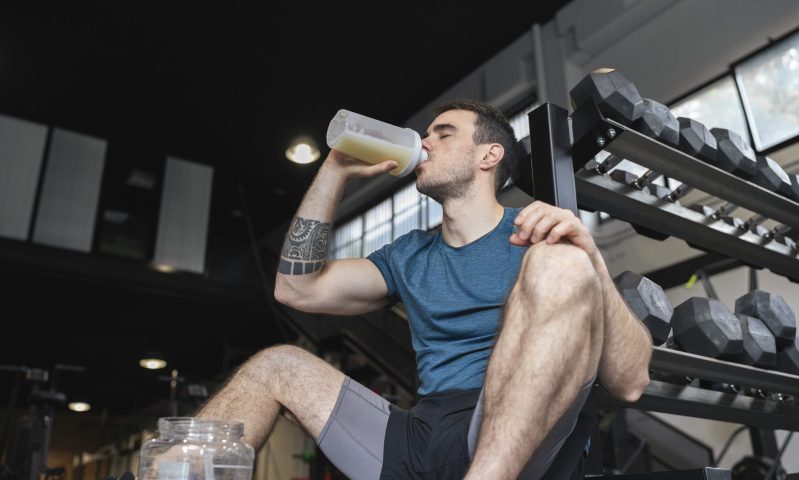Nutrition is crucial to fitness and sports performance. As a trainer and nutritionist, I personally utilize various supplements for nutrition, and I recommend them to many clients as well. Progress toward your fitness goals can be hindered without proper nutrition.
Two of the most popular supplements for athletes and fitness enthusiasts are creatine and protein powder. They have proven to be effective with numerous benefits. These include increased energy levels, fast recovery, enhanced performance, and weight management.
Hence, we will explore the creatine vs. protein debate. What can the supplements do for you? Which one is better for your body and personal goals? It’s time to dive in!
What is creatine?

Creatine is an amino acid that provides a steady energy supply to the muscles when active, especially during exercise. While this compound is present naturally in the body, taking it in supplement form helps enhance its availability. This, in turn, promotes muscle strength, increased mass, and efficient athletic performance.
You can get creatine from your diet, especially protein-rich foods. Likewise, your liver, kidneys, and pancreas produce it. Manufacturers make them as supplements in tablets, powders, liquids, capsules, and energy bars as well.
How does creatine benefit the body?

Improves performance
Creatine directly impacts your performance during exercise or sports regardless of your fitness level, from increased muscle mass to brain performance, ballistic power, strength, resistance to fatigue, muscle endurance, and sprint ability. It is one supplement you can never go wrong with, regardless of the activities you decide to partake in.
Provides energy for muscle cells
This is the most significant benefit of creatine and is often why many people take it. During exercise, your body breaks down adenosine triphosphate (ATP) to get energy, and creatine increases your muscles’ phosphocreatine stores, which aids the formation of ATP. So, if you use more ATP than your body produces, you may not be able to sustain high-intensity exercise for a longer time. But with creatine supplements, you can easily balance the supply and demand of energy for your body.
Aids muscle recovery
A study suggests that ‘’Creatine supplementation may reduce muscle damage and/or enhance recovery from intense exercise.’’ Exercise usually results in muscle soreness due to micro-tears in the muscle. In severe cases, it can impair muscle functions. However, creatine helps hasten the recovery of these muscles after your workout, allowing you to get back in the gym sooner. It activates satellite cells that heal the micro tears.
What does protein powder do for the body?

Muscle growth
Protein is a primary focus among those who consistently include lifting weights as part of their lifestyle. Consuming protein through both food sources and supplements can be great for aiding muscle growth and maintaining overall muscle mass.
A 2018 systematic review supports this idea, as it shares that protein supplements can improve muscle size and strength in healthy adults actively involved in resistance training.
Weight management
An effective way to manage your weight is by increasing your protein intake. Protein is the most satiating macronutrient and helps with appetite control. So, it is easier to consume fewer calories when you include plenty of protein in your diet. Additionally, protein contributes to a faster metabolism, increases fat burning, and prevents muscle loss. Overall, it can be your one-way ticket to burning fat and building muscle or simply managing your weight.
Faster recovery after exercise
Protein is the main building block for cell renewal, tissue growth, and repair. It contributes significantly to faster recovery after exercise and tissue repair after an injury. With protein supplements like powders and bars, soreness and muscle damage from exercise can be reduced.
Is creatine or protein powder a better supplement?

Creatine and protein powder are both beneficial supplements that have different roles to play when it comes to your fitness goals. Creatine provides extra energy to help you get the most out of your exercise sessions and push harder, while protein helps build and repair muscles. So, both supplements are of equal value when it comes down to how they can support you.
How to optimize your nutrition routine with both

Taking creatine and protein supplements together is ideal for optimal results. You can take them either before or after your training sessions, and there is no clear evidence suggesting one is better than the other. Just be sure to stick to the recommended dosage and be consistent. This is especially important for creatine, as you want your muscles to be constantly saturated for the best results. Also, since creatine increases water retention in the muscles, staying hydrated is a must.
Frequently asked questions

Do I need creatine if I take protein?
Not necessarily. While no one needs to take creatine in general, taking the two together has maximum benefits for increased energy, muscle growth, and recovery.
Is there a downside to creatine?
Creatine is safe as long as you stick to the recommended dosage. However, possible side effects may include dehydration, muscle cramps, and stomach upset.
Can I build muscle without protein or creatine?
Yes, you can build muscles without supplements like creatine and protein. These supplements amplify your efforts, but you can still put on muscle without them. It may take longer, but with consistency and a proper diet, you will likely get your desired results.




